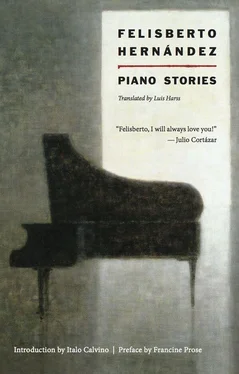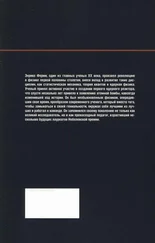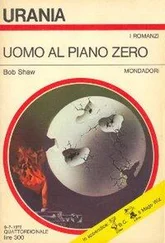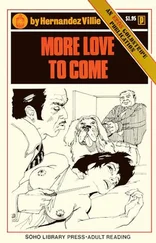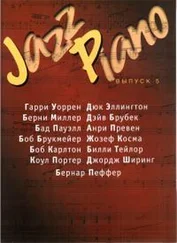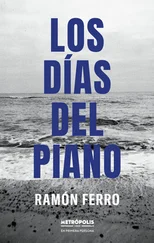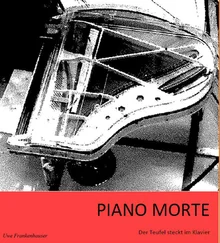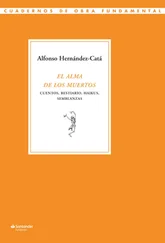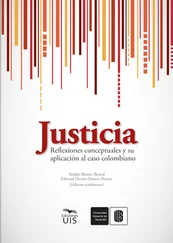Felisberto Hernandez - Piano Stories
Здесь есть возможность читать онлайн «Felisberto Hernandez - Piano Stories» весь текст электронной книги совершенно бесплатно (целиком полную версию без сокращений). В некоторых случаях можно слушать аудио, скачать через торрент в формате fb2 и присутствует краткое содержание. Год выпуска: 2014, Издательство: New Directions, Жанр: Современная проза, на английском языке. Описание произведения, (предисловие) а так же отзывы посетителей доступны на портале библиотеки ЛибКат.
- Название:Piano Stories
- Автор:
- Издательство:New Directions
- Жанр:
- Год:2014
- ISBN:нет данных
- Рейтинг книги:4 / 5. Голосов: 1
-
Избранное:Добавить в избранное
- Отзывы:
-
Ваша оценка:
- 80
- 1
- 2
- 3
- 4
- 5
Piano Stories: краткое содержание, описание и аннотация
Предлагаем к чтению аннотацию, описание, краткое содержание или предисловие (зависит от того, что написал сам автор книги «Piano Stories»). Если вы не нашли необходимую информацию о книге — напишите в комментариях, мы постараемся отыскать её.
Piano Stories
Piano Stories — читать онлайн бесплатно полную книгу (весь текст) целиком
Ниже представлен текст книги, разбитый по страницам. Система сохранения места последней прочитанной страницы, позволяет с удобством читать онлайн бесплатно книгу «Piano Stories», без необходимости каждый раз заново искать на чём Вы остановились. Поставьте закладку, и сможете в любой момент перейти на страницу, на которой закончили чтение.
Интервал:
Закладка:
“Then I won’t tell you what the men did today.”
He had already started to answer:
“No, my dear olive, don’t tell me anything until after dinner.”
And he poured himself a glass of the wine he imported from France.
But his wife’s words had dropped like pebbles into the pond where his obsessions grew, and he could not get his mind off what he expected to see later that night. He collected dolls that were a bit taller than real women. He had had three glass cases built in a large room. In the biggest one were all the dolls waiting to be chosen to compose scenes in the other cases. The arrangements were in the hands of a number of people: first of all, the caption writers (who had to express the meaning of each scene in a few words). Other artists handled settings, costumes, music, and so on. Tonight was the second show. He would watch while a pianist, seated with his back to him, across the room, played programmed works. Suddenly the owner of the black house remembered he must not think of all this during dinner. So he took a pair of opera glasses out of his pocket and tried to focus them on his wife’s face.
“I’d love to know if the shadows under your eyes are also plants.”
She realized he had been to his desk to fetch the opera glasses, and decided to humor him. He saw a glass dome, which turned out to be a bottle. So he put down the opera glasses and poured himself some more wine from France. She watched it gurgle into his glass, splashing black tears that ran down the crystal walls to meet the wine on its way up. At that moment, Alex — a White Russian with a pointed beard — came in, bowing at her, and served her a plate of ham and beans. She used to say she had never heard of a servant with a beard, and he would answer that it was the one condition Alex had set for accepting the job. Now she shifted her eyes from the glass of wine to the man’s wrist, where a tuft of hair grew out of his sleeve, crawling all the way down his hand to his fingers. As he waited on the master of the house, Alex said:
“Walter” (the pianist) “is here.”
After dinner, Alex removed the wineglasses on a tray. They rang against each other, as if happy to meet again. The master, half-asleep — in a sort of quiet glow — was pleasantly roused by the sound and called out after him:
“Tell Walter to go to the piano. He mustn’t talk to me as I come in. Is the piano far from the glass cases?”
“Yes, sir, on the other side of the room.”
“Good. Tell Walter to sit with his back to me, to start on the first piece in the program and keep repeating it without stopping until I flash the light at him.”
His wife was smiling. He went up to kiss her and for a moment rested his flushed face on her cheek. Then he headed for the little parlor off the big show room. There he started to smoke and sip his coffee, collecting himself: he had to feel completely isolated before going in to see the dolls. He listened for the hum of the machines and the sounds of the piano. At first they reached him in what seemed like watery murmurs, as if he were wearing a diver’s helmet. Then he woke up and realized some of the sounds were trying to tell him something, as if he were being singled out from among a number of persons snoring in the room. But when he tried to concentrate on the sounds, they scattered like frightened mice. He sat there puzzled for a moment, then decided to ignore them. But suddenly he realized he was not in his chair any more: he had gotten up without noticing it. He remembered having just opened the door, and now he felt his steps taking him toward the first glass case. He switched on the light in the case and through the green curtain he saw a doll sprawled on a bed. He opened the curtain and mounted the podium, which was actually a small rolling platform on rubber casters, with a railing. From there, seated in an armchair at a little table, he had a better view of the scene. The doll was dressed as a bride and her wide open eyes stared at the ceiling. It was impossible to tell whether she was dead or dreaming. Her arms were spread in an attitude of what could be either despair or blissful abandon. Before opening the drawer of the little table to read the caption, he wanted to see what his imagination could come up with. Perhaps she was a bride waiting for the groom, who would never arrive, having jilted her just before the wedding. Or perhaps she was a widow remembering her wedding day, or just a girl dressed up to feel like a bride. He opened the drawer and read: “A moment before marrying the man she doesn’t love, she locks herself up, wearing the dress she was to have worn to her wedding with the man she loved, who is gone forever, and poisons herself. She dies with her eyes open and no one has come in yet to shut them.” Then the owner of the black house thought, “She really was a lovely bride.” And after a moment he savored the feeling of being alive when she was not. Then he opened the glass door and entered the scene to have a closer look. At the same time, through the noise of the machines and the music, he thought he heard a door slam. He left the case and, caught in the door to the little parlor, he saw a piece of his wife’s dress. As he tiptoed over to the door, he wondered whether she had been spying on him — or maybe it was one of her jokes. He snatched the door open and her body fell on him. But when he caught it in his arms it seemed very light. . and he recognized Daisy, the doll who resembled her. Meantime his wife, who was crouching behind an armchair, straightened up and said:
“I wanted to give you a surprise, too. I just managed to get her into my dress.”
She went on talking, but he did not listen. Although he was pale, he thanked her for the surprise: he did not want to discourage her, because he enjoyed the jokes she made up with Daisy. But this time he had felt uneasy. So he handed Daisy back to her, saying he did not want too long an intermission. Then he returned to the show room, closing the door behind him, and walked toward Walter. But he stopped halfway and opened another door, which gave onto his study, where he shut himself in, took a notebook from a drawer, and proceeded to make a note of the joke his wife had just played on him with Daisy, and the date. First he read the previous entry, which said: “July 21. Today, Mary” — his wife’s name was Daisy Mary, but she liked to be called Mary, so when he’d had a doll made to look like her they had dusted off the name Daisy for the doll — “was in the balcony, looking out over the garden. I wanted to put my hands over her eyes and surprise her. But before I reached her I saw it was Daisy. Mary had seen me go to the balcony — she was right behind me, laughing her head off.” Although he was the only one to read the notebook, he signed each entry with his name, Horace, in large letters and heavy ink. The entry before last said: “July 18. Today I opened the wardrobe to get my suit and found Daisy hanging there. She was wearing my tail coat, which looked comically large on her.”
Having entered the latest surprise, he was back in the show room, heading for the second glass case. He flashed a light at Walter for him to go on to the next piece in the program and started to roll up the podium. In the pause Walter made before taking up the new piece, he felt the machines pounding harder, and as the podium moved the casters seemed to rumble like distant thunder.
The second case showed a doll seated at the head of a table. Her head was tilted back and she had a hand on each side of her plate, on a long row of silverware. Her posture and the way her hands rested on the silverware made her look as if she were at a keyboard. Horace looked at Walter, saw him bowed over the piano with his tails dangling over the edge of the bench, and thought of him as a bird of ill omen. Then he stared at the doll and had the sudden feeling — it had happened to him before — that she was moving. The movements did not always begin right away, nor did he expect them when the doll was dead or lying down, but this time they started too soon, possibly because of her uncomfortable position. She was straining too hard to look up at the ceiling, nodding slightly, with almost imperceptible little jerks that showed the effort she was making, and the minute he shifted his gaze from her face to her hands, her head drooped noticeably. He in turn quickly raised his eyes to her face again — but she had already recovered her stillness. He then began to imagine her story. Her dress and surrounding objects suggested luxury, but the furniture was coarse and the walls were of stone. On the far wall there was a small window, and behind her a low, half-open door, like a false smile. She might be in a dungeon in a castle. The piano was imitating a storm and every now and then lightning flashed in the window. Then he remembered that a minute ago the rolling casters had reminded him of distant thunder and the coincidence unsettled him. Also, while collecting himself in the little parlor, he had heard those sounds that had been trying to tell him something. But he returned to the doll’s story: maybe she was praying, asking God to liberate her. Finally, he opened the drawer and read: “Second scene. This woman is expecting a child soon. She is now living in a lighthouse by the sea. She has withdrawn from the world, which has blamed her for loving a sailor. She keeps thinking, ‘I want my child to be alone with himself and listen only to the sea.’ ” He thought, “This doll has found her true story.” Then he got up, opened the glass door, and slowly went over her things. He felt he was defiling something as solemn as death. He decided to concentrate on the doll and tried to find an angle from which their eyes could meet. After a moment he bent over the unhappy girl, and as he kissed her on the forehead it gave him the same cool, pleasant sensation as Mary’s face. He had hardly taken his lips off her forehead when he saw her move. He was paralyzed. She started to slip to one side, losing her balance, until she fell off the edge of the chair, dragging a spoon and a fork with her. The piano was still making sea noises, and the windows were still flashing and the machines rumbling. He did not want to pick her up and he blundered out of the case and the room, through the little parlor, into the courtyard. There he saw Alex and said:
Читать дальшеИнтервал:
Закладка:
Похожие книги на «Piano Stories»
Представляем Вашему вниманию похожие книги на «Piano Stories» списком для выбора. Мы отобрали схожую по названию и смыслу литературу в надежде предоставить читателям больше вариантов отыскать новые, интересные, ещё непрочитанные произведения.
Обсуждение, отзывы о книге «Piano Stories» и просто собственные мнения читателей. Оставьте ваши комментарии, напишите, что Вы думаете о произведении, его смысле или главных героях. Укажите что конкретно понравилось, а что нет, и почему Вы так считаете.
